Start your day right
Sign up for Essential California for news, features and recommendations from the L.A. Times and beyond in your inbox six days a week.
You may occasionally receive promotional content from the Los Angeles Times.
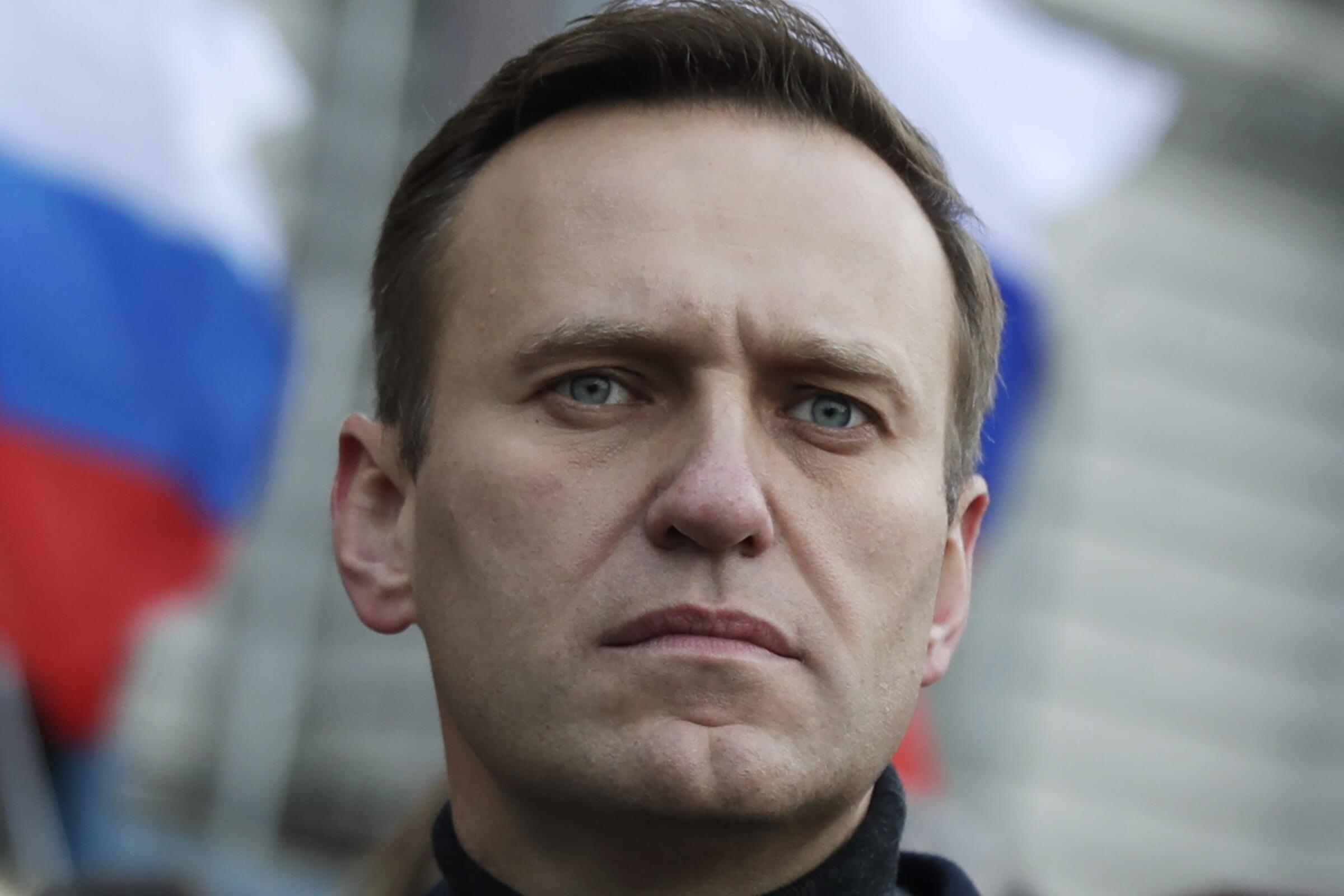
Russian opposition figure Alexei Navalny, who survived a near-fatal poisoning blamed on the Kremlin and wielded black humor and social-media savvy to battle President Vladimir Putin’s autocratic rule even from behind bars, died in prison Friday, Russia’s prison agency said. He was 47.
Supporters of Navalny, Putin’s most unyielding and best-known critic, had long feared for his health and safety as he endured punishing conditions in captivity, most recently at the remote, freezing Arctic Circle penal colony dubbed “Polar Wolf,” where he was reported to have taken a walk before lapsing into unconsciousness and subsequently dying.
Only a day earlier, in a video link from a court hearing at the prison, he had appeared in good spirits, even jokingly asking the judge to help pay the fines he had accrued for supposed misbehavior in confinement.
President Biden, like a host of other Western leaders, blamed Russia’s leader after hearing reports of Navalny’s death, while acknowledging that the circumstances surrounding it were not yet clear. The Kremlin pointed out angrily that a cause of death had yet to be established.
“Putin is responsible for Navalny’s death,” said Biden, praising the opposition leader as brave and principled — “everything Putin is not.”
Hours after the announcement of the death on Russian state media, Navalny’s wife, Yulia Navalnaya, told attendees at the Munich Security Conference in Germany that Russian officials lied constantly, so she did not know whether their assertion that her husband had died was true.
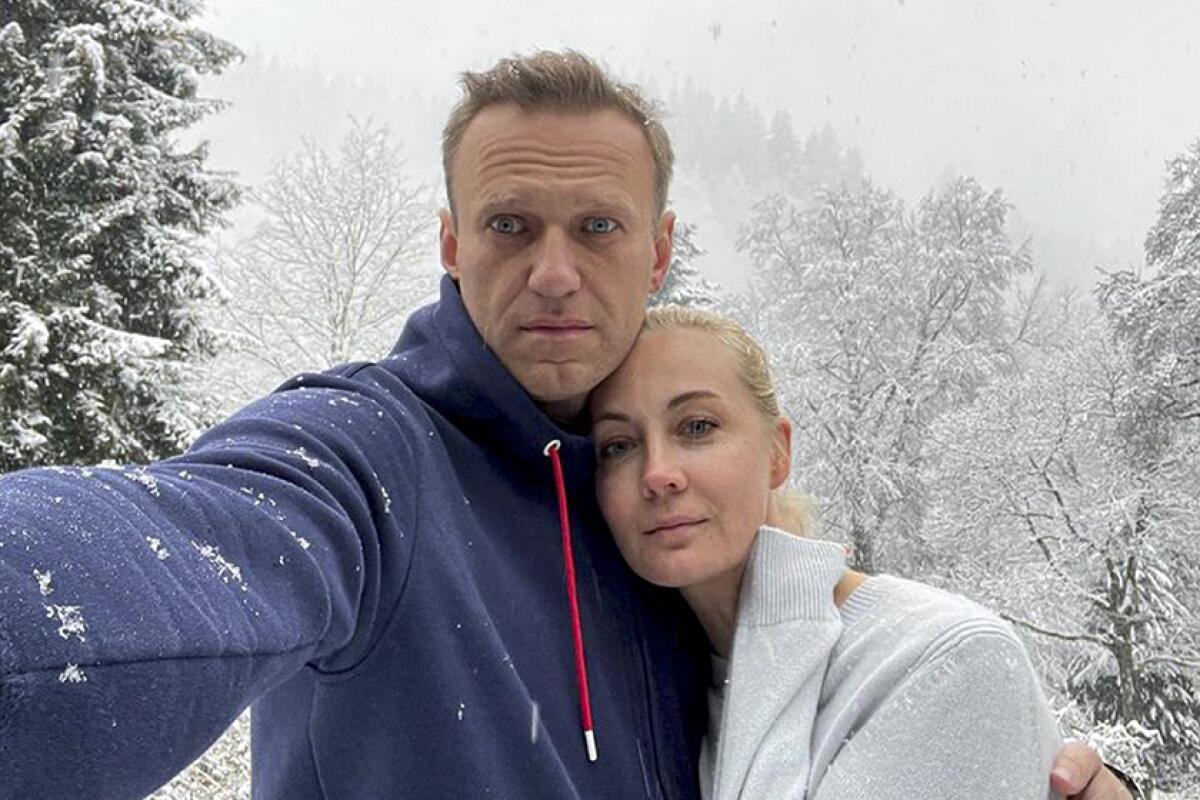
With steely composure, she told the gathering, made up of dignitaries and leaders including Vice President Kamala Harris, that if it was true he had died in custody, “they will be brought to justice.” Audience members leaped to their feet to applaud her.
Also on hand in Munich was Ukrainian President Volodymyr Zelensky. Word of Navalny’s death came eight days before the second anniversary of Putin’s invasion of Ukraine, at a time when Ukrainian forces are struggling on the battlefield and facing ammunition shortages.
Zelensky declared that Navalny was “killed by Putin,” likening the opposition leader’s fate to thousands of others he said had suffered at the hands of “this creature,” the Russian leader.
Word of Navalny’s death was the latest grim reminder of Putin’s still-iron grip on power in a country where opponents have largely been imprisoned or killed or have fled into exile. In a little less than a month, the 71-year-old president, in power for nearly a quarter-century, is poised to claim another six years as president — a fifth term in office — in an election that critics have already derided as meaningless.
Even so, there was little expectation that Navalny’s death would galvanize mass protests. That is in part because previous crackdowns on dissent, especially since the start of the war in Ukraine, have been so harsh, and in part because many Russians have settled into a kind of weary apathy, analysts said.
Russia expert Mark Galeotti said he expected there would “probably not” be large-scale street demonstrations, even if there was a widespread belief that the Russian leader was responsible.
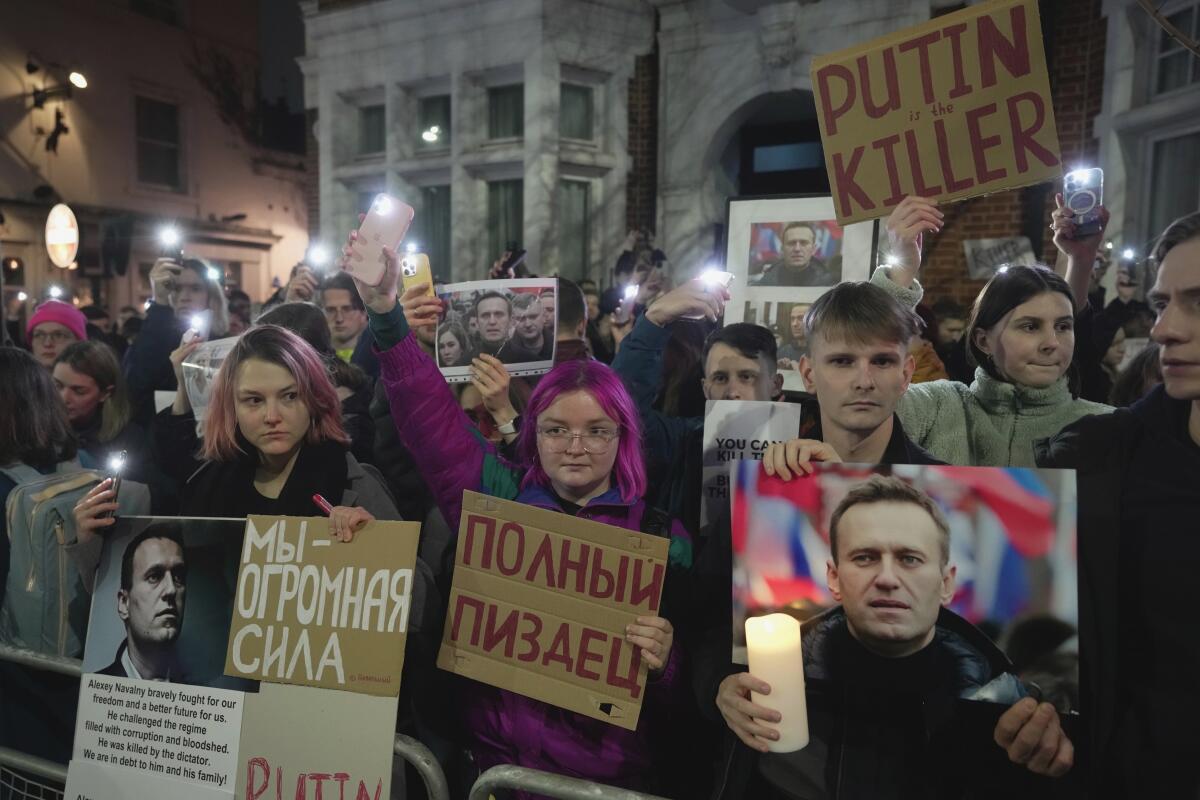
“There is no one who won’t think that, directly or indirectly, Putin killed Navalny,” Galeotti told Britain’s Times Radio. “And I think that is something that we’re going to have hanging around Putin’s neck for the rest of his life.”
Navalny’s team still had not provided independent confirmation of his death by Friday night, but his lawyer and some relatives were en route to the isolated penal colony and expected to arrive Saturday.
In the hours after the first reports of Navalny’s death circulated — first on channels of the messaging app Telegram, then in the prison authority announcement, Putin remained silent on the subject. The official Tass news agency said the Russian leader had been notified of the death, but Putin made no mention of the news while appearing on state television in a question-and-answer session with technical students and workers.
After Navalny was arrested in early 2021, he earned international accolades for scathing denunciations of Putin and the catastrophic war in Ukraine, and for continuing his fight from behind bars for what he called a “beautiful” Russia free of dictatorial rule. However, his health visibly deteriorated during his years of incarceration, first at a notorious penal colony east of Moscow.
His emaciated appearance shocked supporters when he was seen, via a blurry video link, at an Aug. 4, 2023, hearing there at which he was sentenced to 19 years of incarceration on what his supporters said were trumped-up charges of extremism. He was already serving a nine-year sentence imposed after he returned to Russia — and certain arrest — in 2021 following his recovery in Germany from the 2020 attempt to kill him with a military-grade nerve agent.
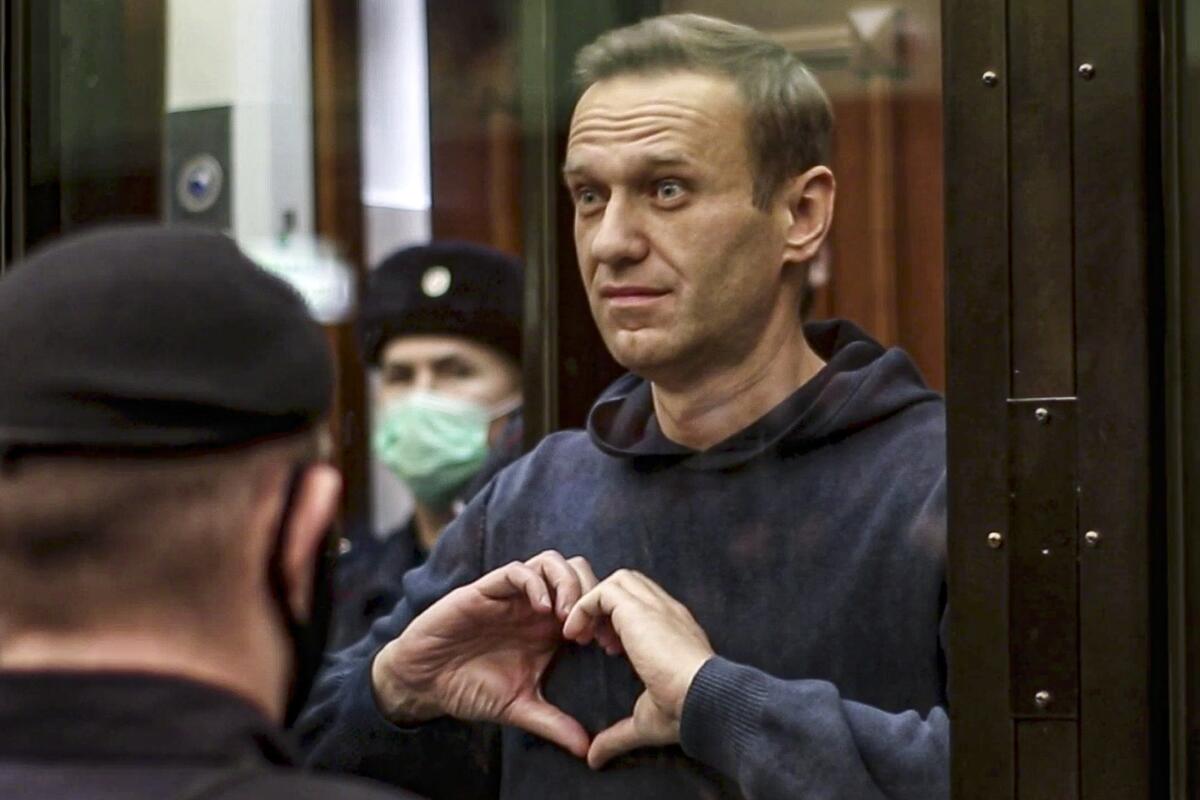
Critics decried the shadowy nature of that trial, held in a makeshift courtroom without family members, journalists or spectators present. In video footage, Navalny — clad in a black prison uniform — appeared even more frail than in other recent appearances, with hair cropped close and eyes blazing out of a gaunt face.
He was moved late last year to the prison colony 1,200 miles northeast of Moscow, where he reported through his lawyers that he was frequently being held in solitary confinement. The Federal Penitentiary Service reported Friday that Navalny had lost consciousness after a taking a walk at the prison and could not be revived. Officials said the cause of his death was “being established.”
Reports of his death drew an outpouring of tributes worldwide, with people, many of them Russian exiles, gathering in capitals, including several in nations that were once part of the Soviet Union. In Russia itself, police chased away or rounded up a smattering of mourners who managed to lay flowers or light candles at locales once associated with Soviet-era abuses.
On Friday, world leaders lamented the opposition figure’s death, many blaming Putin’s government.
“Alexei Navalny fought for the values of freedom and democracy. For his ideals, he made the ultimate sacrifice,” European Council President Charles Michel posted on X. “The EU holds the Russian regime solely responsible for this tragic death.”
The sentencing of Putin critic Alexei Navalny doesn’t solve the Russian president’s problems.
Over the years, from inside and outside prison, Navalny got under Putin’s skin as few other critics managed to do, daring to level taunts at the Russian leader that were more direct and pointed than any opposition figure before him, alleging graft in the president’s inner circle. Putin, for his part, refused for years to utter the name of his nemesis in public.
Following his trial in August of last year, Navalny commented in a social media post, presumably relayed through his team, urging his supporters “not to lose the will to resist.” Of his sentence, he said, the number of years hardly mattered — but he portrayed his plight as an implicit struggle to the death between himself and Putin’s rule.
“I understand perfectly that, as many political prisoners, I’m serving a life sentence, which is measured by the length of my life or the length of life of this regime,” Navalny said then.
The war in Ukraine — a full-scale invasion launched by Putin in February 2022, intended to swiftly subdue Russia’s smaller neighbor — turbocharged the Kremlin’s crackdown on any form of domestic dissent. Independent Russian media outlets were shut down and criticism of the country’s military was designated a criminal offense. Navalny’s team and many other opposition figures soon went into exile.
Navalny, who until then had concentrated his messaging on corruption in Putin’s inner circle, tailored his jailhouse missives to jab repeatedly at a war effort he called unjust and almost comically incompetent, with ordinary conscripts and their families paying the price of the Russian leader’s grandiose ambitions.
“It’s one thing if Putin killed Ukrainian civilians and destroyed life-critical infrastructure with full approval from the Russian citizens,” he wrote in a social media post a month after the war began. “However, it’s a whole different story if Putin’s bloody venture is not supported by the society.”
Ukrainians, however, largely refrained from joining in worldwide lionization of Navalny, with many remembering his tacit initial support of the Russian leader’s illegal seizure and annexation of Ukraine’s Crimean peninsula in 2014. That year, Ukrainians ousted a pro-Kremlin leader in a popular uprising, and Russia fomented a separatist uprising in Ukraine’s industrial east — events considered by Ukraine to be the beginning of the current war.
Imprisoned Russian opposition leader Alexei Navalny learned from his lawyer that a film detailing his political activism won an Oscar.
From Navalny’s early days as a blogger, he rose from being a relatively little-known gadfly — a lawyer who doggedly documented corruption in high places — to the country’s best-known opposition figure. In 2023, a film about his activism and recovery from poisoning won an Academy Award for best documentary feature. He was taking part in a video-link court hearing from prison when he learned of the Oscar.
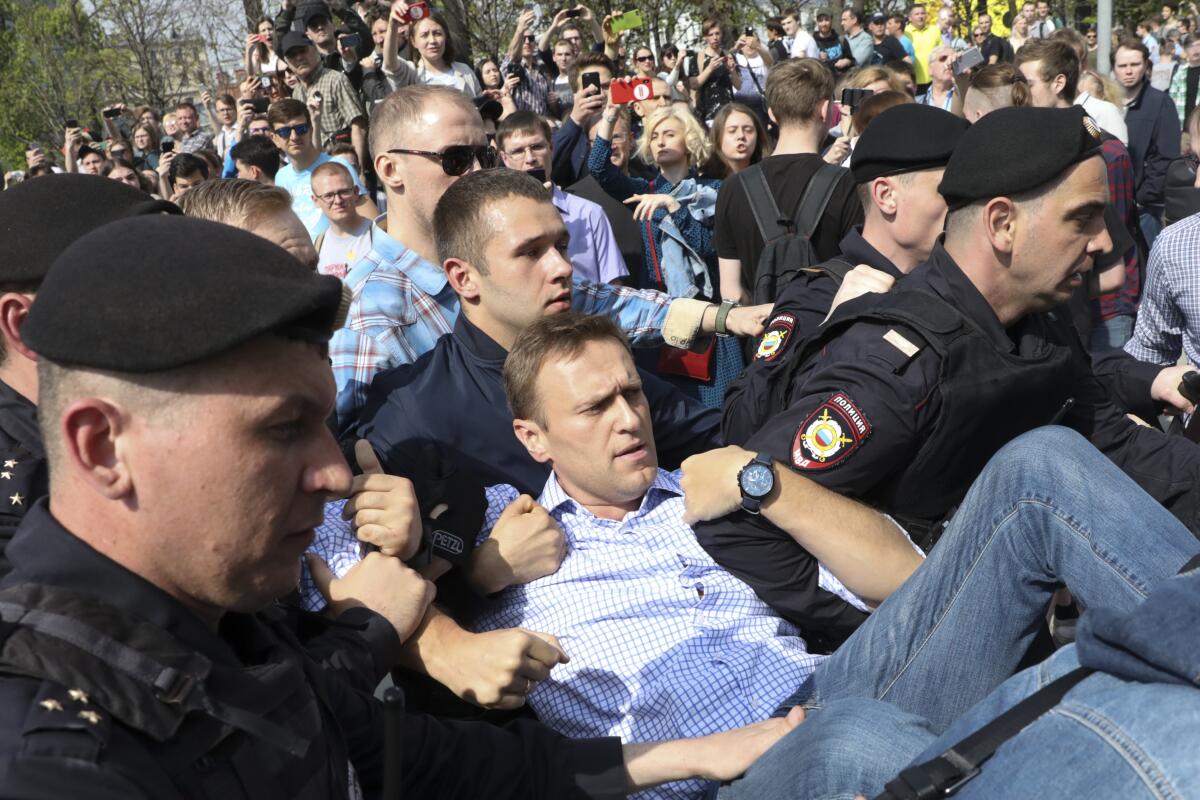
After his January 2021 arrest, protests — the largest in Russia in at least a decade — spanned all of the country’s 11 time zones and triggered thousands of arrests.
After Navalny began a hunger strike in late March 2021 to protest Russian authorities’ denial of proper medical treatment — for ailments probably linked to his poisoning with what Western doctors said was the nerve agent Novichok — his plight prompted anguish and fury from supporters at home and around the world.
Protesters across Russia have pressed for authorities to release Putin critic Alexei Navalny
An Instagram post by Navalny about his hunger strike ordeal employed the biting tone to which his followers were accustomed, describing how a prison official “detailed the joys of force-feeding to me.”
His 2021 imprisonment — part of a legal cascade that led to the 19-year sentence he was serving at the time of his reported death — was purportedly for a parole violation. Supporters called the charge Kafkaesque, because he was then hospitalized in Germany, recovering from the poisoning.
Behind bars, he developed severe back pain and numbness in his legs, possible side effects of his poisoning. Russian authorities responded to his requests for proper medical care by sending in what Navalny called a propagandist — Maria Butina, a Russian who had served prison time in the United States for working as a foreign agent. She arrived with a television crew to mock his claims of ill treatment.
Even as Navalny languished, his backers kept up a drumbeat of claims over high-level corruption. In April 2021, his organization — which had released a widely viewed video called “Putin’s Palace,” about an opulent Black Sea compound purportedly paid for by the president’s wealthy supporters — put out a new investigation into Putin’s reported use of a luxurious residence on a lake northwest of the Russian capital.
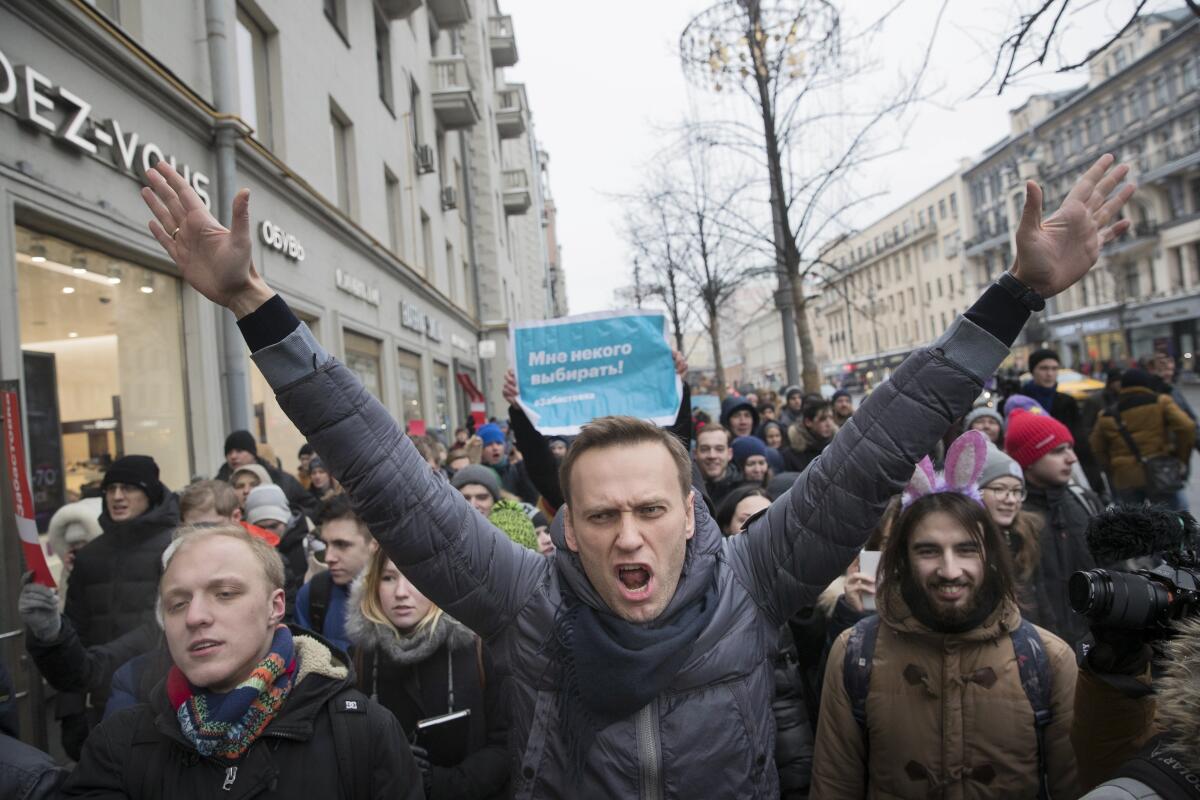
Navalny’s fifth and final criminal conviction had to do with the work of his foundation, which Russia had outlawed as an extremist organization in 2021, along with his other offices. The extremism charges criminalized all of the anti-corruption foundation’s activities since its 2011 founding, Navalny’s allies said.
A Russian court has convicted imprisoned opposition leader Alexei Navalny of extremism charges and sentenced him to 19 years in prison.
The court ordered Navalny to serve the new term in a “special regime” penal colony, where men given life sentences or “especially dangerous recidivists” are sent.
He was already being held in a maximum-security prison — Penal Colony No. 6 in the town of Melekhovo — and had spent months in a tiny, one-person “punishment cell.” His alleged infractions included not washing his face at a specified time and not buttoning his clothing properly.
Before reports of Navalny’s death, some Western analysts had suggested that recent political developments may have left Putin feeling even more emboldened. A European consensus in favor of large infusions of aid to Ukraine is largely holding, but in the United States, far-right Republicans in Congress have blocked a tranche of what Ukrainian officials describe as badly needed assistance.
Earlier this month, former President Trump, the front-runner for the Republican presidential nomination, sent ripples of alarm through NATO nations in Europe when — wrongly characterizing the alliance as a kind of club into which dues were paid — he told a political rally crowd that he would encourage Russia to do “whatever the hell they want” to any U.S. ally whom he considered in arrears.
North Atlantic Treaty Organization members have a spending target of 2% of GDP on defense, and not all meet that benchmark.
Trump’s remaining rival for the GOP nomination, former South Carolina Gov. Nikki Haley, sought Friday to draw a sharp distinction between herself and Trump, whom she describes as alarmingly deferential to Putin.
“Putin murdered his political opponent,” she wrote on X, “and Trump hasn’t said a word after he said he would encourage Putin to invade our allies.”
Navalny had managed to record a video from an institutional-appearing location, to be released by his team in the event of his death.
“You’re not allowed to give up,” he said to supporters. “If they decide to kill me, it means that we are incredibly strong. We don’t realize how strong we actually are.”
Times staff writer King reported from Washington. Former special correspondent Vasiliy Kolotilov in London and the Associated Press contributed to this report.
Start your day right
Sign up for Essential California for news, features and recommendations from the L.A. Times and beyond in your inbox six days a week.
You may occasionally receive promotional content from the Los Angeles Times.